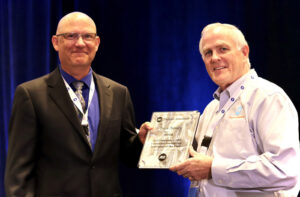Creating your pipeline of techs will differentiate the good shops from those that are going to be left behind
Overland Park, Kan.—In the heavy-duty/diesel industry, there is an expected need for at least 32,831 new technicians for 2023 alone. And according to research from the ASE Education Foundation, 42 percent of career tech graduates will leave the industry within their first two years.
The one sustainable competitive advantage for shops seeking to fill the technician void is implementing a systematic and repeatable technical mentoring and apprenticeship program. Being able to tell an entry-level technician (and their instructors) that a shop has a written mentoring program and career path can set it apart from other shops.
“Vehicle technology is growing exponentially. Entry-level technicians need an employer who is ready, willing, and able to train and prepare them for the industry,” said Lirel Holt, CEO of Mentor Mentee. “Creating your own pipeline of technicians will differentiate the good shops from those that are going to be left behind as experienced technicians retire at an ever-increasing pace.”
Here are seven tips to give you the best chance of implementing a successful mentoring program:
1. Prove to your local CTE instructors that you are for real. Anyone can tell an instructor they have a mentoring program. Invite them out to your shop and show them how you will continue to enhance a young technician’s understanding, further the instructor’s training efforts, and how you develop a plan specific to each student.
2. Get buy-in and understanding from staff and ownership before implementing a technical mentoring or apprentice program. Seventy percent of workplace initiatives fail due to a lack of leadership commitment. If you build an on-the-job training program, communicate with all stakeholders early on, and get all staff to understand there is a plan and why they should be on board. Without buy-in, staff can undermine the goal. Show them how mentoring programs create upward momentum for the business, which benefits all staff.
3. Have two plans for each mentee: long-term (what you can become) and short-term (what you’ll do daily to get there). Sell a career vision to a mentee and set realistic expectations along the way. In writing, show the entry-level technician where they can go and how you will help them get there. Everyone wants to know, “What’s the plan?” Don’t forget: A plan is not a plan unless it is in writing.
4. Use a task list. This is the best way to put your day-to-day plan in writing. Many programs will start without direction or standard duties. The program’s manager and mentors should identify 30 to 50 tasks for a mentee to focus on from the beginning. Ensure often-overlooked items such as safety, vehicle placement in bays and soft skills. Do you still have to work with what is coming in the door daily? Of course. But with a task list, both the mentor and mentee are looking for opportunities to work on the core, foundational tasks in front of them.
5. Track training progress against the task list. Whether you use paper, Excel, or a total software solution, it is essential to track task progress to understand what task areas mentees are winning, losing, and needing more exposure. Mentors and mentees should work together to track the number of repetitions a mentee has on each task and their quantitative and qualitative improvement in time and quality of each task performed.
6. Use the mentee’s progress data to celebrate wins and offer incentives. You can’t do No. 6 if you don’t do No. 5. When a mentee develops a new skill, publicly point it out and celebrate. Provide incentives for mentors and mentees to reach their goals. These can be monetary or non-monetary incentives. Small efforts to recognize their success as a team and to celebrate those with the whole staff builds positive feedback loops and keeps your entire staff engaged in the success of your program.
7. Do not allow bullying. Celebrate successes, but provide constructive feedback in private when a mentee makes a mistake. The same goes for mentors. And do not allow anyone in the shop to bully a young tech. Bullying only makes it look like management doesn’t care about the success of their own trainees or program.









Comments are closed.